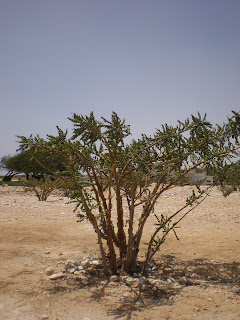-UK and Canadian saying, implying the person thinks that they are of great importance.
Since our last blog entry Tina and I have been tangling through the day to day events that keep us all “busy”. Finally we decided to take off with our friends Lucas and Tenielle and head south to the city of Salalah for our 4 day Easter weekend.
Along the northern coastline of Oman is where the vast majority of the population lives. The Muscat area contains the masses and the settlements trickle off in the either direction until you hit the UAE in the West or coast too rugged to settle in the East. South of Muscat there are the long, jagged Hajar mountains running from east to west slicing the country in half. Beyond this range is a desolate, unforgiving desert plateau that stretches for nearly 1000km until it plunges abruptly into the warm ocean at the southern tip of Oman. Where this plunge occurs is the site of the ancient city of Salalah.

Although many have never heard of Salalah it is famed as the alleged home of the Queen of Sheba, the bearer of Frankincense, among the most important trading cities in ancient Arabia, and host of one of the most important wars that nobody has heard of. Admitedly it may not have massive international appeal but it was enough to hook us.


To locals the main draw of the city is the summer monsoon season of constant rain bringing beautiful green hills and vegetation sorely lacking in the rest of the region. As much as we laughed at the idea of this “draw” it really was quit amazing to see vegetation, water and green again. As a side note ruining the serene setting by yelling "Canonball!! Everybody in!!" and plunging into the water, doesn't go over really well with the locals. Who knew?

The first day was spent exploring east of the town. We drove through secluded bays filled with white sand, tourquise water and dolphins chasing schools of fish. In one of these bays lies the site of the Queen of Sheba’s palace, where she controlled the sale of Frankincense in the south with King Solomon in the Holy Land to the north. We continued along weaving around countless wandering camels, passing through sleepy coastal villages, enjoying the green lushness of a flowing Wadi, and finally hiking over the large sand dunes and enjoying the clear ocean that awaited us on the other side. With the increase in traffic at a previously isolated spot I think the local fellas enjoyed us as well. In fact two low flying helicopters flew by as we swam. Everyone was very poilte just very interested. As much as it pains me to admit, I think neither Lucas nor I were of any interest at all.


The second day was spent journeying towards the Yemen border. Taking in Jobs tomb, Frankincense sites, active blowholes and beautiful scenery we forgot one important item. As we climbed through the mountainous coastline that leads to Yemen we became painfully aware of our low supply of gas and the complete lack of places to fill this need. After one Army checkpoint we had to head back as it was clear we’d be out of petrol quite literally in the “middle of nowhere”. Since it was illegal for us to cross at the border anyways, the only thing we missed was the chance to get turned away by a surely border guard. Another time.
Our final day was spent in the town itself and we filled our time walking through the fruit plantations, eating at huts, strolling along the beaches and through the frankincense laden markets. In the market they have a strange combination of frankincense stores, perfume stores, and gun paraphanalia stores. I guess you want to smell nice when you're shooting stuff.

It was in the market that a man bumped into Tina and he was wearing no shirt, a sarong, a large traditional knife on his waist and carried a rifle on his shoulder. Upon further review, he gets the right of way. Naturally, our Aussie mates pulled out their knives and said, "You call that a knife? This is a knife". (Ok, so Paul Hogan wasn't with us but it would have been great) We saw several old men carrying rifles with them around town and these are the Jebali men from the surrounding hills.
It was these men that fought for their independence from a British-backed Oman in the 1960’s and 1970’s. This began as a local fight but the rebels soon began being trained by the Russians and the Chinese Marxists of the time. Many theories abound but a well recognized theory is that the communists of the time wanted control of Oman through this battle so they could control the Straight of Hormuz. The Straight of course, is the mouth into the Persian Gulf. Speculation spins wildly from that point but it has been called a “crucial but forgotten conflict” of the cold war period. We four sun burnt tourists posed no such threat.
In the coming weeks we will enjoy our Spring break that may take us to the Nothern point of Oman, Musandam.

Hope everyone had a nice Easter break and that spring has "sprung" for you wherever you are.












